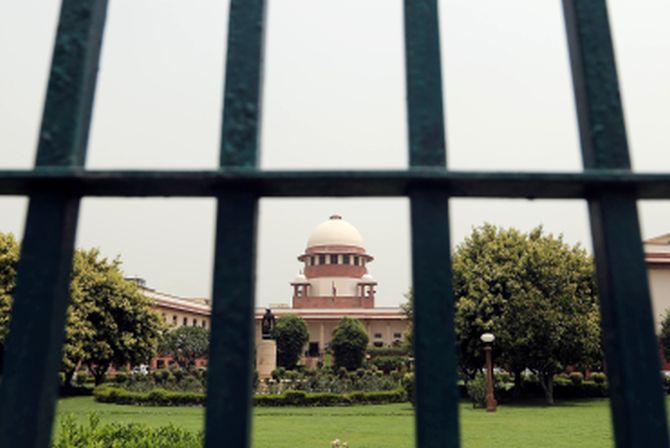
Names of chief ministers of Punjab and Karnataka -- Captain Amarinder Singh and H D Kumraswamy -- along with a former chief minister found mention in the list of 4,122 criminal cases pending against serving and ex-legislators that was submitted before the Supreme Court on Tuesday.
Former Karnataka chief minister B S Yeddyurappa, also figured in the list along with serving Kerala minister M M Mani and sitting Nationalist Congress Party MLA from Gujarat Kandhalbhai Sarmanbhai Jadeja.
A report containing the list said nine cases are registered against former Karnataka Bharatiya Janata Party member of legislative council and mining baron G Jannardan Reddy.
Of these, eight are punishable with life imprisonment while one is punishable with imprisonment with seven years.
The apex court, which is dealing with a public interest litigation on the issue, was informed that first information report registered in 2017 with SIT Lokayukta against Kumaraswamy for offence punishable with life imprisonment is awaiting final report, pending probe.
The report said a corruption case against Captain Amarinder Singh is pending since 2007 and charge has not yet been framed.
The submissions were made in the report filed by senior advocate Vijay Hansaria, who is assisting the court as amicus curiae in the matter along with advocate Sneha Kalita.
It said Yeddyurappa has 18 cases against him out of which 14 are punishable with life imprisonment.
In the case of Kerala Electricity Minister M M Mani lodged in 1982, charges have not yet been framed even though the charge sheet was filed on November 18, 2015.
The report said in Gujarat, six criminal cases are pending against Jadeja, out of which three offences were registered between 1994 and 1998 under Terrorist and Disruptive Activities Act and/or Arms Act punishable with imprisonment for life or 10 years.
“In all these three cases charges have not been framed and matter is under stay either before the Supreme Court/ high court,” it said.
In Uttar Pradesh, it said, all the 992 cases have been transferred to the special court for MPs and MLAs at Allahabad, both triable by sessions as well as magistrate.
The charges have not been framed in 395 of these cases, and the high court has put a stay on 14.
It said 22 FIRs are registered against former Samajwadi Party MP Ateeq Ahmed, out of which 10 are for offences punishable with imprisonment for life or death sentence, and are pending at various stages.
12 FIRs are registered against former Shiv Sena MLA Pawan Kumar Pandey, between 1989 and 2017, out of which three are for offences punishable with imprisonment for life/ death sentence, and are pending at various stages, it said.
It said six FIRs are registered against former SP MLA Khalid Azeem, between 2003 and 2011, out of which five are for offences punishable with imprisonment for life/death sentence are pending at various stages.
Six FIRs are registered against sitting BJP MLA Upendra Tiwari, between 1996 and 2011, out of which three are for offences punishable with imprisonment for life/ death sentence are pending at various stages.
FIR was registered against former MLA Chote Lal Gangwar, in which charge sheet was filed on December 14, 1999 and the present status is not known, it said.
In Bihar, there are total 23 cases pending which are punishable with life term registered between 1991 and 2018.
The report said FIRs were registered against sitting legislators Shamim Akhtar, Anant Kumar Singh, Randhir Kumar Soni of Janata Dal-United and Sarfaraz Alam of Rashtriya Janata Dal, for offence punishable with imprisonment up to life but charges haven’t been framed yet.
The report said FIR was registered against sitting BJP MLA Shashikant Mohabat Ram Pandya in 1998 for offences, punishable with imprisonment up to life and the charges were framed in 2014 but the case is at the stage of recording prosecution evidence.
In Karnataka, there are total 58 cases pending against MLAs punishable with imprisonment for life most of whom are on the basis of SIT constituted by the Lokayukta.
“Out of these 58 cases, 34 cases are against 9 sitting MLAs and 24 cases are against 6 former MLAs. Most of these cases registered in 2015 and the final report is awaited," it said.
In Madhya Pradesh, all 168 cases have been transferred to the Special Court for MPs/ MLAs at Bhopal, both triable by Sessions as well as Magistrate, the report said, adding that there are total 36 cases pending which are punishable with imprisonment for life, registered between 1998 and 2018.
Three FIRs are registered against Congress leader Digvijay Singh all of which are punishable with imprisonment for life, it said.
In Maharashtra, 31 Magisterial trial cases have been transferred to Chief Metropolitan Magistrate, Mumbai, who has been designated for cases of MPs/ MLAs in terms of the orders of this court and involve 23 sitting legislators but in 21 cases charges have not been framed.
33 criminal cases are pending against former Congress MLA Ramesh Chandra Jena in Odisha out of which five offences were registered under Section 302 Indian Penal Code (murder) punishable with death sentence or imprisonment for life.
In Tamil Nadu, 321 cases are pending out of which only 71 are pending trial and in 188 cases even charges have not been framed.
While in West Bengal, out of 269 cases, 231 have been transferred to the special court for MPs/ MLAs, while 38 sessions trial cases of MP/ MLA have been transferred to special court in Andhra Pradesh.
The SC directed setting up of special designated courts in each district of Bihar and Kerala to ensure effective trial of pending criminal cases involving former and sitting lawmakers in these two states.
The top court fixed the sequence for cases to be tried in these designated courts and said that cases against sitting or former MP or MLA involving offences punishable with life imprisonment or death sentence shall be taken as a first priority.
A bench of Chief Justice Ranjan Gogoi and Justices Sanjay Kishan Kaul and K M Joseph said that creating designated courts in each districts will be a more effective step instead of concentrating all the cases involving former and sitting legislators in one special court.
"Instead of designating one sessions court and one magisterial court in each district we request each high court to assign/allocate criminal cases involving former and sitting legislators to as many sessions courts and magisterial courts as the each high court may consider proper, fit and expedient," the bench said after perusing the data of pending cases against the lawmakers.
Senior advocate Vijay Hansaria, appointed as amicus curiae to assist the court in the matter in his report pointed out that there are presently 4,122 number of pending cases against MPs/MLAs including former lawmakers.
He suggested to the bench that the designated special courts in each districts should hold trial for the cases against lawmakers on a day to day basis in a particular priority starting with cases involving offences punishable with imprisonment for life/death against sitting MPs/MLAs.
Hansaria along with advocate Sneha Kalita, who had filed the data received from different states and high courts, said that after the trial of cases involving sitting lawmakers, cases of former MPs/MLAs should be tried.
The bench, however, modified his suggestion and said that the designated courts should take up cases of both sitting as well as former MPs/MLAs involving offences which entail punishment of life term or death sentences as a first priority.
‘The procedural steps indicated by the amicus curiae, will be followed by each designated court to whom work would be allocated in terms of the directions except that offences punishable with imprisonment for life/death against sitting MPs/MLAs as well as former MPs/MLAs would be taken up on first priority followed by sequential order without creating any distinction between cases involving sitting legislators and former legislators,’ the bench said in its order.
The bench said that at this stage, its direction shall be made applicable to cases involving former and sitting legislators in Bihar and Kerala.
The bench noted the submission of Hansaria which said that concentration of all the cases against former and sitting lawmakers in 12 Special Courts set up earlier would result in delay of trial on account of witnesses and accused being required to come from far away places.
The bench said, "The National Capital Territory of Delhi where the position is somewhat different and the difficulties of distance and territories do not come in the way the trial of cases by the Special Courts (both Sessions Court and Magisterial Court) will continue".
It directed that cases records pertaining to the matters involving lawmakers in Kerala and Bihar which were transmitted to the special courts, should be re-transmitted forthwith to the jurisdictional district courts.
"The registry of the high courts of Kerala (State of Kerala) and Patna (State of Bihar) will initiate necessary action in this matter without any delay," it said.
The bench, however, made it clear that the rest of the special courts already set up by the earlier direction of apex court shall continue to work and try cases assigned to it until further orders.
It asked the designated courts in each districts of Kerala and Bihar to submit monthly report to the high court with regard to the cases where charge-sheets have not yet been filed, charges not framed with appropriate reasons and the progress of the trial.
The court directed the Kerala and Patna high courts to place their action taken report before it on or before December 14.
Hansaria, in his report, said that in 1991 cases of sitting and ex-MPs/MLAs including some which are pending for nearly three decades, charges have not been framed.
He said that there are a total of 430 cases, which involve offences punishable with life term or death sentence, pending against sitting as well as former legislators.
The court was hearing a PIL filed by lawyer and BJP leader Ashwini Upadhyay seeking a life time ban on politicians convicted in criminal cases besides the setting up of special courts to expeditiously try cases involving elected representatives.
Hearing another case, the SC also sought urgent steps for early conclusion of cases against undertrials as 67 per cent prisoners in the ‘overcrowded’ jails across India are undertrials.
It also directed the undertrial review committees (UTRCs) to meet every month for the first six months of 2019 to review the cases of undertrial inmates and submit reports to the legal services authorities in states.
Set up in every district, UTRCs deliberate and recommend the release of undertrial prisoners as also of those convicts who have undergone the sentence or are entitled to be released due to bail or remission granted to them.
A bench headed by Justice Madan B Lokur took note of the National Legal Services Authority (NALSA) data placed before it that while the holding capacity of jails in the country as on December 31 last year was around 3.78 lakh, the actual number of inmates lodged was 4.19 lakh.
The bench, also comprising Justices Deepak Gupta and Hemant Gupta, said the state legal services authorities would compile the data received from the UTRCs and send the report to NALSA.
The top court is hearing a matter relating to inhuman conditions in 1,382 prisons across India. It is also seized of a separate matter related to speedy trials for undertrial prisoners.
The court noted that as per NALSA's data, the number of inmates in jails were in excess of the holding capacity of the prisons and ‘overcrowding was particularly acute’ in states like Uttar Pradesh, Maharashtra, Chhattisgarh and Uttarakhand.
“We have been given to understand that undertrial prisoners constitute of 67 per cent of prison population,” it said. "Number of undertrial prisoners is very, very large."
The apex court also took on record the standard operating procedure (SOP) prepared by NALSA for UTRCs and said that it be circulated among the Director General (Prisons) and state legal services authority of all the states and union territories.
On September 25, the court had constituted a three-member committee, headed by former apex court judge Amitava Roy, to look into jail reforms across India and make recommendations on several aspects, including overcrowding.
It had said the 'Supreme Court Committee on Prison Reforms' would also comprise of Inspector General of Police of Bureau of Police Research and Development and Director General (Prisons) of Delhi's Tihar Jail.
It had earlier taken strong exception to overcrowding of jails across the country and said prisoners also have human rights and cannot be kept like ‘animals’.
The court had earlier passed a slew of directions over unnatural deaths in jails and on prison reforms across India.











 © 2025 Rediff.com -
© 2025 Rediff.com -